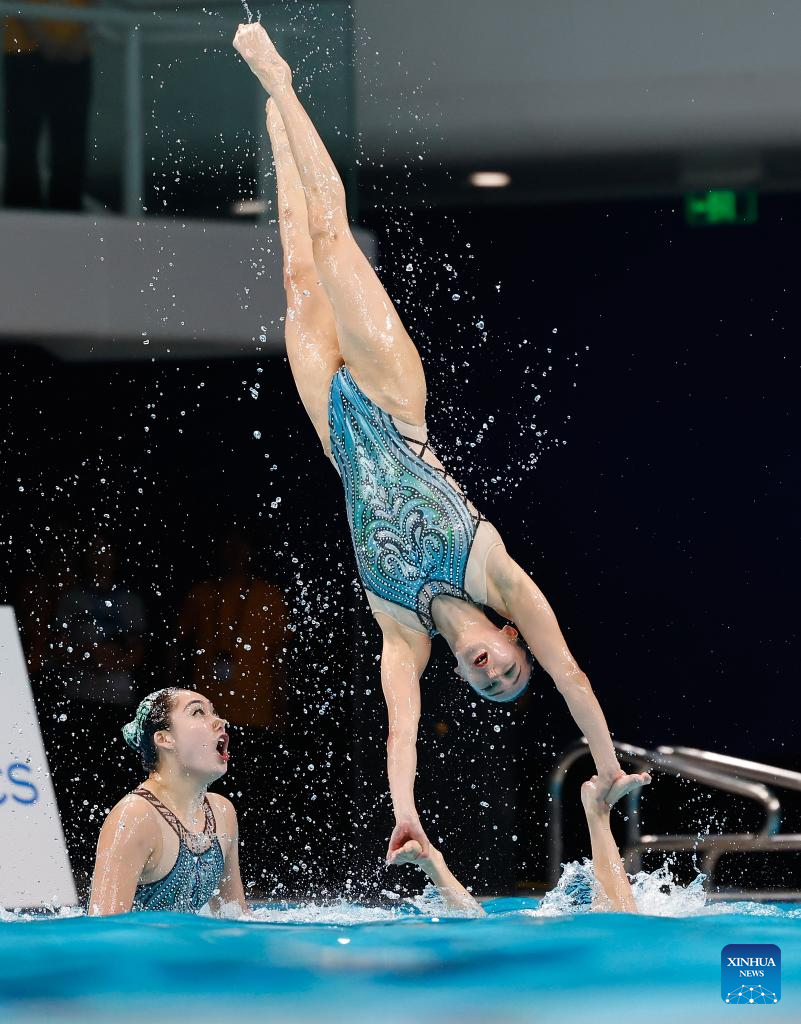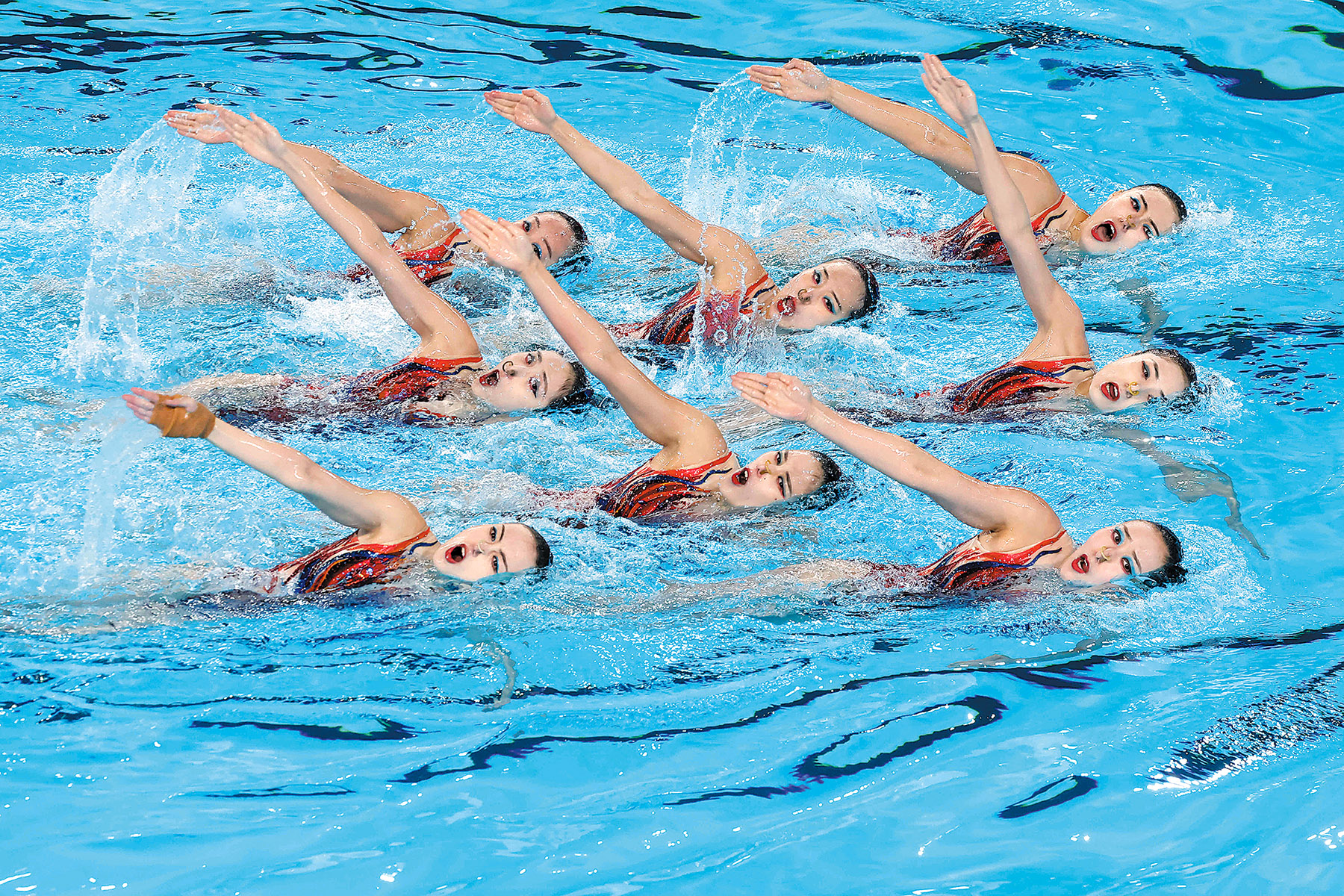China’s rapidly improving artistic swimming team heads to Paris Olympics in quest to finally turn silver into gold

With less than two months remaining until the Paris Games, the Chinese artistic swimming team has already familiarized itself with the competition venue and it is ready to make waves as it strives for Olympic glory this summer.
Last month, the second stop of the 2024 World Aquatics Artistic Swimming World Cup was held at the brand-new Olympic Aquatic Centre in Paris, marking its debut as an official competition venue.
The three-day event attracted sellout crowds, who witnessed the Chinese team secure a silver medal in the team technical event and a fourth-place finish in the team acrobatic final.
Alongside the Le Bourget Climbing Wall, the aquatics center is one of the few permanent sports facilities being built for the Paris Games. Scheduled to host artistic swimming, water polo, and diving at the Olympics, the center is notable for its exclusive use of bio-sourced materials, establishing it as a low-carbon facility committed to achieving outstanding energy and environmental performance.
Chinese team captain Feng Yu viewed the event as an ideal opportunity for the team to acclimate to the Olympic venue, effectively serving as a test run for the upcoming Games. “Any surprises or issues encountered during this competition will lay a solid foundation for our future preparations,” Feng stated.
China claimed silver in the team event at the past three Olympic Games in London, Rio, and Tokyo, but the gap to the gold is steadily narrowing.
At the World Aquatics Championships in Doha in February, China achieved its best performance to date — seven golds, one silver, and one bronze.
Notably, China clinched a third consecutive artistic swimming team free world title in Qatar, completing a golden hat-trick.
Team China has already secured qualification for both the team and duet events in the Paris Games’ artistic swimming competitions, which are due to take place from Aug 5 to 10.
Feng and her teammates are currently engaged in rigorous preparations. Feng highlighted the significant transformations witnessed within the team from the previous Olympic cycle to the current one, particularly the infusion of cutting-edge technological support.
Notably, coaches now administer comprehensive tests on various physiological metrics, such as maximum oxygen intake and muscle strength, offering invaluable insights into athletes’ physical capabilities, according to Feng.
“In this cycle, we’ve also incorporated underwater photography technology. While most attention tends to be on the surface, some persistent challenges may actually lie beneath the water,” she said.

Feng perceives the role of captain as imbuing her with a heightened sense of responsibility. “The unwavering trust and expectation placed in me by every coach and team member provide tremendous impetus for my personal growth.”
“The Chinese artistic swimming team epitomizes cohesion, with each of us sharing a singular goal and dream. There’s a profound trust among us, and we constantly inspire one another,” Feng emphasized.
In artistic swimming, there is a key team member known as the “performer”. This athlete stands at the top during lifting sequences, soaring into the air as the centerpiece of the routine. Other team members work together to create a human pyramid and lift the performer.
Chang Hao, 27, is the performer on Team China. She reveals that underwater communication among teammates involves intricate hand signals, with two fingers symbolizing leg movements, facilitating precise coordination.
In Feng’s mind, the lifting sequences represent not only the pinnacle of the routine but also offer the greatest challenges, demanding flawless coordination among all eight participants.
“On the stage, our trust in one another knows no bounds. Positioned as the intermediary, I feel the strength passed from the teammates below, while also channeling support to the performer above. It’s a pivotal role that connects both realms seamlessly,” she said.
During competition, the distinctive fusion of Chinese-inspired attire and makeup stands as a hallmark of the national team. Chang said that there is a meticulous process that involves collaboration with professional designers and coaches.

As for the makeup, Chang said that it is applied quite generously, considering the distance from the judges during competitions is typically around 10 to 20 meters.
This ensures the features of each swimmer remain visible, even during the performances in the water, she said. Expressing the team’s aspirations for the current campaign, Chang voiced its collective ambition: “We aim to grace the winners’ podium wearing our distinctive awards attire,” she concluded.
Twin sisters Wang Liuyi and Wang Qianyi are poised to make a splash at the Paris Olympics, competing in both the duet and team events.
Their Olympic journey began with a standout performance at last year’s Hangzhou Asian Games, where they clinched the artistic swimming duet title, securing their tickets to Paris. The 27-year-old duo also collected a gold medal in the team event.
Reflecting on their rigorous preparation, Wang Liuyi shed light on the challenges of adapting to new rules introduced last year. The updated regulations revolve mainly around scoring — breaking routines down into “elements” and “degree of difficulty” — and how those areas are judged on an artistic and technical level.
“Our approach has evolved,” Wang Liuyi explained. “Each competition now carries potential changes and risks of deductions, demanding our utmost focus. Our training regimen has intensified, requiring extensive practice and seamless coordination. Moreover, the need to fine-tune our routines for every competition has bolstered our mental resilience.”

The sisters devote over 10 hours a day to perfecting their routines in the water, setting their sights on a triumphant performance on the grand stage of the Paris Olympics.
The sisters made their international debut in 2014. Wang Qianyi remembers that, when they were starting out, they just passed the minimum level, but soon their performance shot up to 90 points out of 100.
“Now we’re aiming for 100 points. It might take a while but we’re determined not to give up,” she said.
The Paris Games will be the first time the sisters have competed together on the Olympic stage. At the pandemic-delayed Tokyo 2020 Olympics, Wang Qianyi earned a silver medal in the artistic swimming team event, while her older sister Wang Liuyi missed out due to injury.
“In the last Olympics, I competed alone because my sister couldn’t participate due to injury. Ever since, I’ve wanted to stand on the Olympic stage again, but with her at my side,” she said.
“I just want to tell my sister that, despite all the challenges to come back and compete with me, she’s amazing. Together, we’ll make our dreams come true,” the younger Wang added.
Inspired by her sister’s encouragement, Wang Liuyi decided to continue pursuing her Olympic dream after the disappointment of missing Tokyo.
“We both show love through actions. I hope we can eventually achieve our dreams,” she said.


